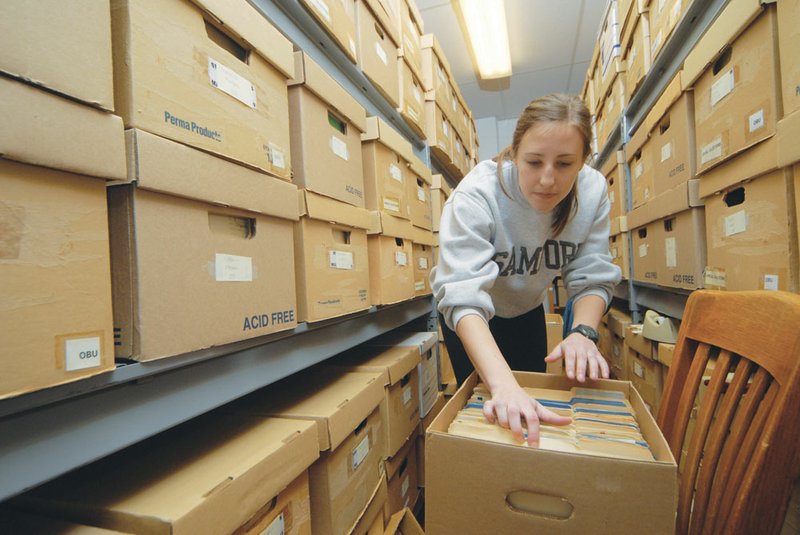ARKADELPHIA — Wendy Richter, an archivist at Ouachita Baptist University, examined the contents of a box pulled from a shelf in the basement of the Riley-Hickingbotham Library. The box — one of hundreds in Ouachita’s Special Collections — was labeled Wharton Camera Collection and contained camera bodies and lenses that are decades old.
“Wharton was probably a Ouachita student,” Richter said, returning the box to its place, label side out. Other boxes hold court records, maps, photos, academic papers, political mementos and the state’s largest oral-history collection.
The archive is the official repository of the political papers of former Gov. Mike Huckabee, former 4th District Congressmen Jay Dickey and Mike Ross, and U.S. Sen. John L. McClellan. The archive also contains records from area churches, as well as the Arkansas Baptist State Convention.
“We cover all time periods,” Richter said. “We have the journal and compass of William Dunbar.” He and George Hunter were the first Americans to explore the Ouachita River. “They were commissioned by President Thomas Jefferson to explore the ‘hot springs.’”
Ray Granade, library director, said a collection
like Ouachita’s helps distinguish the library from others with similar offerings.
“Libraries are about access — we have the book on the shelf; you go find it,” he said. “An archive is about preservation. It’s not just a collection of books, but rarities.”
Items are available to patrons but not in the same way other library materials are.
“There’s someone between you and the materials,” Granade said. “Being an archivist requires a certain skill set. Someone will come in and say they’re interested in missionaries to China — we ask questions to find out exactly what they want to see. We have to look at the material from their perspective.”
Richter said archivists also do lots of heavy lifting.
“One of the job requirements is to lift 40-pound boxes.”
Genealogists, teachers and students make use of the holdings.
“We get about 1,200 requests per year,” she said.
“We acquire things through personal connections,” Granade said. “Usually, somebody tells me, ‘So-and-so had such-and-such.’ Can you come cart it off?’ Lord, yes! That’s why I bought a truck.”
Trivia, he said, makes the work interesting.
“Archivists get to read other people’s letters, and it’s OK!”
He told of an estate sale that yielded an “ingenious” find.
“Some letters were found in an old house, and bagged up and tossed out in the yard,” Granade said. “I put the bags in my Chevy Luv and went Dumpster-diving for the rest. I got permission from the university to keep whatever I found, and told my students that we were going to examine the contents. We discovered a correspondence between this man and his wife, letters written during both world wars.”
Granade and his students uncovered a code the man had developed in World War I that he later used in World War II to circumvent military censors and let his wife know where he was stationed. The letters became part of Special Collections.
Old papers require special preservation techniques. Acid-free boxes, laminates and protection from heat, light and “varmints” are important to the process, Granade said.
People think they can keep these old things safe by sticking them under the bed,” he said, “but for an archivist, the world is like Monk — it’s a dangerous place.”
Archiving political collections can take years of painstaking work. It will take at least three years to complete the Ross collection. Richter said the materials will be surveyed, analyzed, described and filed away in acid-free folders and boxes.
One challenge will be figuring out how to archive Ross’ electronic files.
“We haven’t done that before,” Granade said. “We’ll have to go to [libraries] that have and ask them, ‘What works? What doesn’t work? What would you have done differently?’”
He said modern technologies like fax machines and paper shredders “have changed what we know about history. Most people, including politicians, keep two email accounts, and really sensitive stuff is handled over the phone.”
Ouachita was able to secure Huckabee’s papers, thanks to the school’s connection to Huckabee, a Ouachita graduate. McClellan was convinced that he needed to keep his political papers “in the same area which he served,” Granade said.
“We’re big enough to know how to take care of this stuff but small enough to care that we have it,” he said. “We’re glad to have it, and we promote it so that scholars will use it. That’s the premise on which we operate.”
In addition to hiring student workers, Special Collections employs two assistants, Gail Hennagin and Eric Mahfouz.
